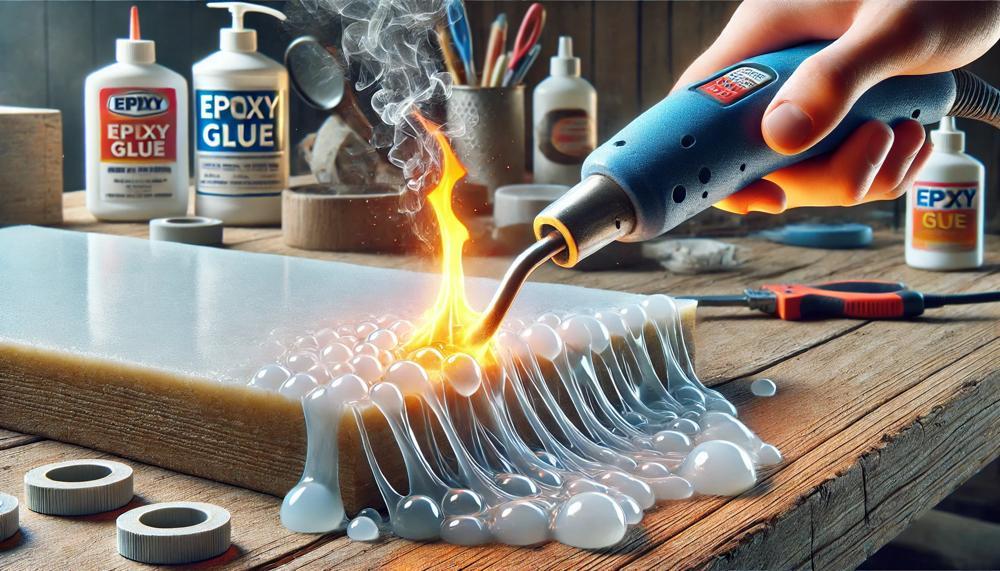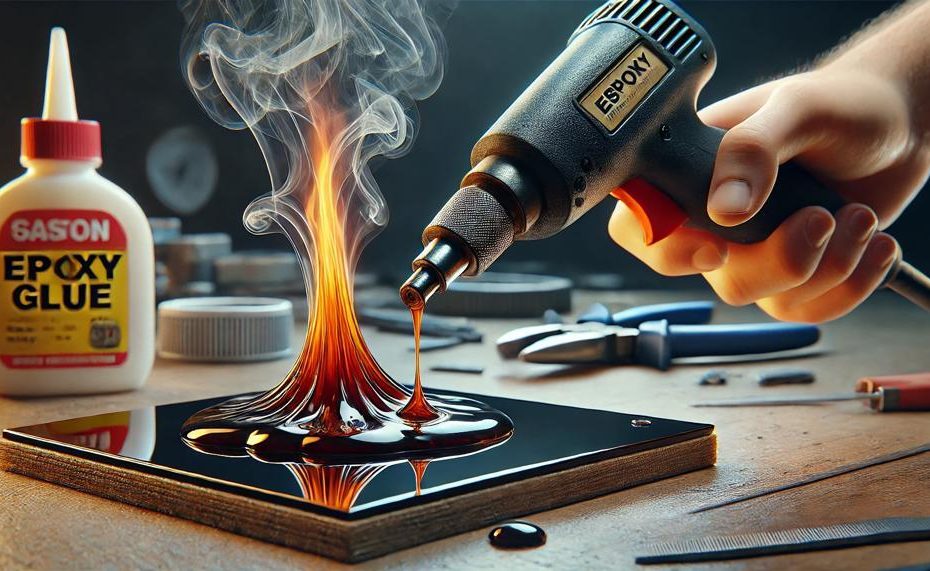Yes, Epoxy Glue Can Withstand Heat – Here’s Why It Matters
Epoxy glue is known for its remarkable strength and durability, but can it withstand high temperatures? The answer is yes, to a certain extent. Epoxy glue’s heat resistance varies depending on its type and the specific temperature range it’s exposed to. Generally, most epoxy glues can endure temperatures between -20°C to 80°C. However, specialized formulations can handle extreme temperatures up to 600°F (315°C).
Understanding the heat tolerance of epoxy glue is crucial for various practical applications. Whether you’re repairing a broken appliance, working on an automotive project, or creating art that must endure the elements, knowing how epoxy performs under heat can save you time and effort. Selecting the right type of epoxy ensures your project stands the test of time and temperature, maintaining its bond and integrity.
Key Takeaways:
- Temperature Range: Most epoxy glues withstand -20°C to 80°C; high-temperature variants can handle up to 600°F (315°C).
- Heat Exposure: Prolonged exposure to high temperatures may degrade the adhesive properties of epoxy glue.
- Factors to Consider: Formulation, curing process, material compatibility, and intended use are critical when selecting epoxy for high-temperature applications.
- Advantages: Exceptional bonding, water and chemical resistance, high tensile strength, and outdoor durability.
- Disadvantages: Reduced heat resistance in some types, potential brittleness over time, and application challenges in high-temperature environments.
- Types of High-Temperature Epoxy: Options include ceramic-based, silicone-based, polyimide-based, and modified epoxy adhesives.
With this knowledge, you can make informed decisions for your next project, ensuring the right epoxy glue for the job, especially when heat resistance is a priority.
Table of Contents
What Is Epoxy Glue?
Epoxy glue stands out from other types of adhesives due to its exceptional strength, versatility, and remarkable resistance to various environmental factors, including heat. Here’s how it differs from other glues and what makes it unique:
Epoxy Glue vs. Other Adhesives
| Aspect | Epoxy Glue | Other Glues |
| Composition | Consists of two main components: epoxy resin and hardener. | Typically single-component, such as cyanoacrylate (super glue) or PVA (white glue). |
| Bond Strength | Forms a very strong bond, often stronger than the materials being bonded. | Varies, with some like super glue being strong but brittle, and others like PVA being weaker. |
| Versatility | Suitable for a wide range of materials and conditions, including metal, plastic, wood, and ceramics. | Often material-specific, with limited versatility. |
| Durability | Resistant to moisture, chemicals, and mechanical stress. | May degrade or weaken when exposed to moisture or chemicals. |
| Heat Resistance | Can withstand high temperatures up to 600°F (315°C) or more, depending on the type. | Generally less heat resistant, with some types failing at lower temperatures. |
| Flexibility | Options available for flexible bonds that resist cracking. | Often rigid, prone to breaking under stress or movement. |
| UV Resistance | UV-resistant varieties available to prevent yellowing under sunlight. | Many adhesives degrade or discolour under UV exposure. |
Heat Resistance Capabilities
Epoxy glue’s heat resistance is particularly noteworthy. This property stems from the chemical reaction between the epoxy resin and the hardener during the curing process, which generates heat and creates a strong, durable bond.
The unique formulation of certain high-temperature epoxy glues allows them to maintain their integrity and adhesive properties at temperatures reaching up to 600°F (315°C) or more.
This makes epoxy glue an excellent choice for applications in harsh environments, such as automotive, aerospace, and industrial settings.
Epoxy glue’s robustness under heat also varies depending on its type:
- Standard Epoxy Glue: Suitable for temperatures between -20°C to 80°C.
- High-Temperature Epoxy Glue: Formulated to resist extreme heat, used in demanding applications like engine components and high-performance equipment.
The Benefits of Using Epoxy Glue
Epoxy glue performs exceptionally well in high-temperature environments. It can withstand temperatures up to 600°F (315°C) for short durations, making it ideal for applications that demand heat resistance. This quality makes it particularly suitable for use in engine compartments, ovens, and other settings where temperatures can soar.
Key Benefits of Epoxy Glue in High-Temperature Environments
| Attribute | Description | Applications |
| High Heat Resistance | Epoxy glue can endure temperatures up to 600°F (315°C) without losing its structural integrity. | Engine compartments, ovens, industrial machinery. |
| Strong Bonding | Its two-component composition creates a robust bond that remains stable under extreme heat. | Automotive and aerospace industries. |
| Versatility | Suitable for bonding a variety of materials including metal, wood, and plastic. | Household repairs, industrial manufacturing. |
| Durability | Maintains strength and adhesion even after repeated exposure to high temperatures. | Electronics, cookware repairs. |
Why Choose Epoxy Glue?
Epoxy glue is not just about strength; it’s about reliability in extreme conditions. Whether you’re fixing a part in an engine or securing components in a high-heat environment, epoxy glue ensures that the bond remains strong and intact.
Epoxy Glue Temperature Tolerance
Epoxy glue can withstand temperatures up to 600°F (315°C) without losing its adhesive properties, depending on the type of epoxy used.
Different formulations of epoxy glue have varying heat tolerances. Here’s a breakdown of the maximum temperature limits for various types of epoxy adhesives:
| Type of Epoxy Glue | Maximum Temperature Tolerance | Applications |
| Standard Epoxy | 80°C (176°F) | General repairs, household uses |
| High-Temperature Epoxy | 200°C (392°F) | Electronics, automotive repairs |
| Ceramic-Based Epoxy | 315°C (600°F) | Industrial ovens, engine compartments |
| Silicone-Based Epoxy | 250°C (482°F) | Aerospace, high-performance machinery |
To ensure optimal performance in high-temperature applications, consider the specific epoxy formulation and the duration of heat exposure.
Specialized epoxies, like ceramic-based or silicone-based formulations, offer enhanced heat resistance, making them suitable for more extreme conditions. However, even these high-temperature epoxies can eventually degrade with prolonged exposure to their maximum temperature limits.

Best Heat Resistant Epoxy for Metal
The top three heat-resistant epoxy products recommended for metal surfaces are:
- Stone Coat Epoxy
- J-B Weld HighHeat Epoxy Putty
- PC Products PC-Fahrenheit
| Product | Features | Applications |
| Stone Coat Epoxy | Withstands high temperatures, durable, non-toxic when cured | Metal countertops, repair work, industrial applications |
| J-B Weld HighHeat Epoxy Putty | Resists temperatures up to 450°F (232°C), easy to apply, sets quickly | Automotive repairs, metal pipes, machinery |
| PC Products PC-Fahrenheit | Handles temperatures up to 500°F (260°C), strong bonding, water-resistant | Engine parts, exhaust systems, metal fixtures |
Stone Coat Epoxy stands out due to its high heat resistance and durability. It’s perfect for metal countertops and industrial applications where intense heat is common. J-B Weld HighHeat Epoxy Putty is an excellent choice for automotive repairs and other high-heat scenarios, providing a robust and quick-setting solution.
Best Heat Resistant Epoxy for Ovens
When considering heat-resistant epoxy for ovens, durability and temperature resistance are key factors. Here are the top recommended products and their comparative analysis:
| Brand | Durability | Temperature Resistance |
| Stone Coat Epoxy | Highly durable; excellent for high-use surfaces | Up to 475°F (246°C) |
| J-B Weld HighHeat Epoxy Putty | Extremely strong; ideal for high-stress repairs | Up to 500°F (260°C) |
| PC Products PC-Fahrenheit | Durable for industrial and household use | Up to 500°F (260°C) |
Stone Coat Epoxy
Stone Coat Epoxy is well-regarded for its robust durability and high-gloss finish, making it ideal for countertops and other high-use surfaces in kitchen environments. Its heat resistance of up to 475°F ensures it can handle the heat from ovens and hot pans without degrading.
J-B Weld HighHeat Epoxy Putty
J-B Weld HighHeat Epoxy Putty is renowned for its incredible strength and high-stress resistance, perfect for heavy-duty repairs in oven settings.
With a heat tolerance up to 500°F, it is well-suited for applications where direct and prolonged heat exposure is common.
PC Products PC-Fahrenheit
PC Products PC-Fahrenheit offers a balance of durability and high-temperature resistance, making it versatile for both industrial and household applications.
Its ability to withstand temperatures up to 500°F makes it reliable for use around ovens and other high-heat environments.
Is Epoxy Flammable When Dry?
No, epoxy glue cannot catch fire when it is dry. Once fully cured, epoxy resin is not flammable. However, it can burn if exposed to sufficiently high temperatures. Here’s a detailed explanation:
| Stage | Flammability | Details |
| Unmixed Components | Partially Flammable | Epoxy consists of two parts – resin and hardener. The resin can be flammable, whereas the hardener generally is not. |
| During Curing | Combustible | When mixed, epoxy can generate heat as it cures, becoming combustible. This process requires high temperatures, potentially over 400°F (204°C), to ignite. |
| Fully Cured | Not Flammable | Once cured, epoxy resin is stable and not flammable. It can withstand high temperatures but will only burn if exposed to extreme heat for prolonged periods. |
Important Considerations:
- Ventilation: Epoxy should be used in a well-ventilated area due to the flammable fumes released during curing.
- Heat Generation: The curing process can generate significant heat, which could be a fire hazard if not managed properly. For instance, pouring a large amount of curing epoxy over wood might cause the wood to ignite due to the heat generated.
- Handling: Handle uncured epoxy with care, keeping it away from open flames and high heat sources.
What Happens to Epoxy When Heated?
Heat significantly impacts the strength and durability of epoxy glue. When epoxy is subjected to elevated temperatures, its mechanical properties undergo substantial changes, which can affect its performance.
| Temperature Range | Effect on Epoxy | Details |
| Room Temperature (20-25°C) | Optimal Strength | Epoxy retains its designed mechanical properties and adheres well. |
| Moderate Heat (50-80°C) | Reduced Strength | Epoxy starts to soften, leading to a decrease in compressive and flexural strength. This can cause the glue to be less resistant to external forces. |
| High Heat (>80°C) | Significant Degradation | At temperatures above 80°C, epoxy experiences considerable loss in strength and becomes brittle. Prolonged exposure can cause permanent damage, reducing the adhesive’s durability. |
| Extreme Heat (>120°C) | Potential Failure | Epoxy may char and lose its adhesive properties entirely, leading to bond failure. This is critical in applications where heat resistance is paramount. |
In essence, while epoxy glue performs well at room temperature, its strength and durability decline with rising temperatures. At moderate heat, the epoxy becomes less effective, and at high temperatures, it risks becoming brittle and failing. For applications involving heat, selecting a high-temperature-resistant epoxy or ensuring proper cooling is crucial to maintain bond integrity.
Will Epoxy Bond Be Ruined by Heat?
The short answer is, yes, excessive heat can ruin an epoxy bond. Heat significantly impacts the strength and durability of an epoxy bond, and its effects can vary depending on the temperature range.
How Heat Affects Epoxy Bond Strength and Durability
| Temperature Range | Effects on Epoxy Bond | Details |
| Low Temperatures | Decreased Viscosity and Bond Strength | Epoxy becomes thicker, harder to apply, and may not penetrate porous surfaces well. Low temperatures slow down the curing process, resulting in weaker bonds. |
| Moderate Temperatures | Optimal Curing and Bond Strength | Epoxy cures properly and forms strong bonds. These conditions are ideal for most epoxy applications, ensuring durability and resilience. |
| High Temperatures | Decreased Flexural and Compressive Strength | Excessive heat accelerates the exothermic reaction, potentially leading to rapid curing but also weaker bonds. Prolonged exposure to high heat can cause epoxy to soften, lose strength, or delaminate. |
| Extreme Temperatures (Thermal Shock) | Cracking and Delamination | Rapid temperature changes can cause thermal shock, inducing stress that may crack or delaminate the epoxy bond, significantly reducing its structural integrity. |
Conclusion
Epoxy glue’s heat resistance is a defining trait that enhances its versatility and reliability across various applications. Most standard epoxy glues can handle temperatures between -20°C and 80°C, making them suitable for everyday repairs and household uses. For more demanding tasks, specialized high-temperature epoxies can withstand up to 315°C (600°F), ideal for environments like engine compartments or industrial machinery.
This resilience to heat is critical because it allows epoxy glue to maintain its structural integrity and adhesive properties even under thermal stress. Whether you’re fixing an appliance or working on an automotive project, choosing the right epoxy based on its temperature tolerance ensures long-lasting results. By understanding the thermal capabilities of different epoxy types, from standard to high-temperature formulations, you can ensure that your bonded components endure the rigors of heat without compromising strength or durability.
In essence, the heat resistance of epoxy glue is not just a bonus feature but a vital attribute that extends its application range, making it indispensable for both common repairs and specialized industrial uses.






